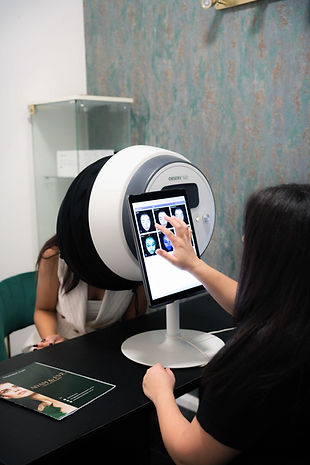
Melasma
Melasma, characterised by dark patches on the skin, can be challenging to manage, but our targeted treatments are designed to fade these areas and restore your skin's even tone. We customise each treatment to suit your skin type, helping you achieve a luminous, glowing complexion. With our expertise, you can confidently address melasma and enjoy clearer skin.
ABOUT MELASMA
ABOUT
Melasma is a common skin condition characterised by the appearance of dark, discoloured patches on the skin, typically on the face. Often referred to as "the mask of pregnancy" because it frequently affects pregnant women, melasma can also occur due to other hormonal changes, sun exposure, and genetic predisposition. While melasma is not harmful and doesn't cause physical discomfort, it can be a significant cosmetic concern for many individuals.
SYPMTOMS
The primary symptom of melasma is the development of dark, irregularly shaped patches on the skin. These patches typically appear on: - The face, especially the cheeks, forehead, bridge of the nose, upper lip, and chin. - Other sun-exposed areas, such as the forearms and neck, though this is less common. The patches are usually symmetrical, meaning they appear similarly on both sides of the face. The discolouration can vary in colour from light brown to dark brown or even grayish, depending on the severity and skin type. Unlike other skin conditions, melasma does not cause itching, pain, or other physical symptoms, but it can affect one's self-esteem and confidence.
Causes
Melasma is primarily caused by an overproduction of melanin, the pigment responsible for skin color, which leads to the formation of dark patches. Key factors that contribute to melasma include: Hormonal Changes: Hormonal fluctuations, particularly during pregnancy (often called chloasma or "the mask of pregnancy"), as well as the use of birth control pills or hormone replacement therapy, can trigger melasma. Sun Exposure: Ultraviolet (UV) rays from the sun can exacerbate melasma by stimulating melanocytes, the cells responsible for melanin production. This is why melasma often worsens in the summer months and improves in the winter. Genetics: A family history of melasma can increase your likelihood of developing the condition, as genetics play a significant role in skin type and susceptibility to pigmentation disorders. Skincare Products: Certain cosmetics or skincare products that irritate the skin can make melasma worse, particularly those that cause inflammation or increase sensitivity to sunlight. Medications: Some medications, including those that make the skin more sensitive to sunlight, can trigger or worsen melasma. Understanding these causes is essential for managing melasma effectively, as avoiding triggers like sun exposure and choosing appropriate skincare can help prevent the condition from worsening.

OUR RECOMMENDED TREATMENTS
SHOP SKINCARE FOR MELASMA

Prior to any skin treatment, it's essential to understand your skin's unique needs and challenges. Our comprehensive skin consultation featuring the Observ 520 skin analysis, a vital step in achieving your skincare goals.
With the Observ 520 skin analysis, we provide an in-depth assessment of your skin's condition, analysing various factors such as pigmentation, hydration levels, and sun damage. This advanced technology allows us to identify underlying issues that may affect treatment outcomes and tailor a personalised skincare plan to address your specific concerns. By gaining insights into your skin's health and characteristics, we can ensure that every treatment is precisely tailored to deliver optimal results.




























































